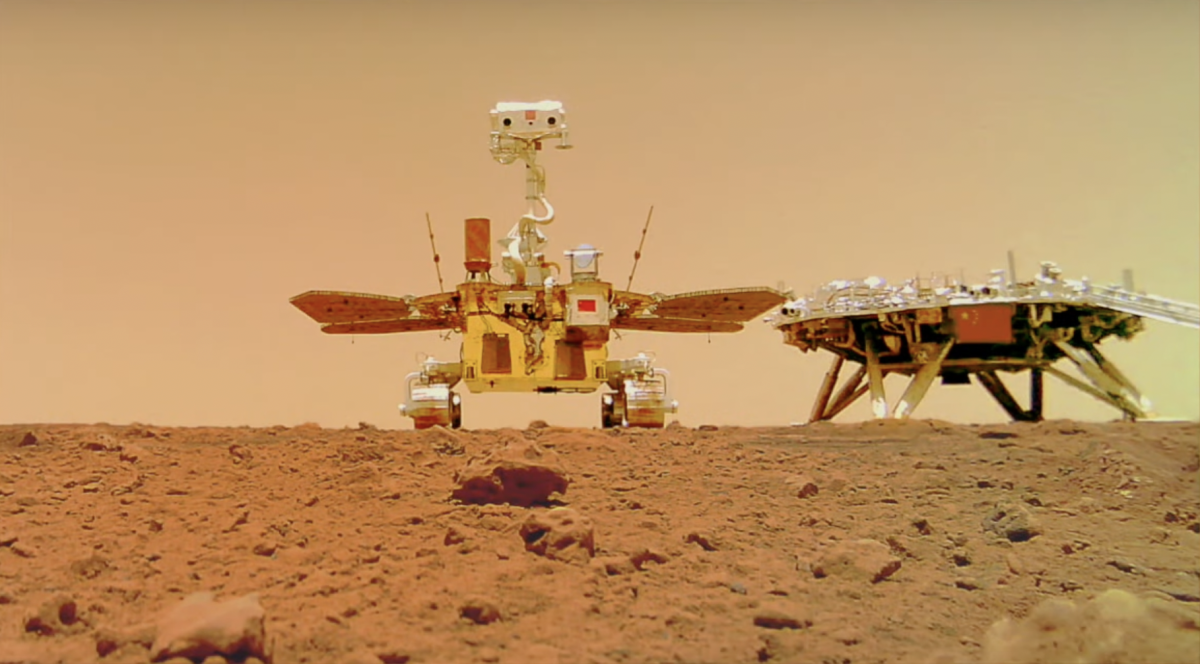Zhurong was expected to wake up in December but Beijing and authorities have remained silent on the status of the rover…reports Asian Lite News
China’s first interplanetary mission Tianwen 1 to Mars has completed its second anniversary but the country is silent on the status of the mission’s Zhurong rover.
Zhurong was expected to wake up in December but Beijing and authorities have remained silent on the status of the rover, reports Space.com.
The rover does not carry a radioisotope heater unit, like other rovers including China’s Yutu moon explorers.
It has a pair of “windows” allowing a chemical called n-undecane to store heat energy.
“Dust storms in Utopia Planitia may have impacted the rover’s ability to generate heat and light. This could potentially be the issue explaining Zhurong’s silence,” the report said.
Both the Tianwen 1 orbiter and Zhurong rover have completed their primary missions.
Launched in July 2020, the mission’s orbiter monitored the weather on Mars’ southern hemisphere, while the six-wheel solar-powered Zhurong rover mapped the Red Planet since it landed and started operations in May 2021.
The rover, named Zhurong after the god of fire in Chinese mythology, entered hibernation on May 18 due to severe winter weather.
The probe transmitted about 1,040 gigabytes of raw data back to Earth, which will eventually be released for scientists around the world.
China is now aiming to beat NASA and ESA in returning Mars samples to Earth.
According to Sun Zezhou, chief designer of the Tianwen-1 Mars orbiter and rover mission, China plans for a two-launch profile, lifting off in late 2028 and delivering samples to Earth in July 2031.
Life on Mars
According to a research team co-led by a Cornell University astronomer, current state-of-the-art instrumentation being sent to Mars to collect and analyze evidence of life might not be sensitive enough to make accurate assessments.
In a paper published in Nature Communications, visiting planetary scientist Alberto Fairen, and an international team of researchers, claim that ancient organic material in Martian rocks could be difficult, if not impossible, to detect with current instruments and techniques. Fairen – also a research professor at the Center of Astrobiology (CAB) in Madrid – and colleagues conducted tests on sedimentary rocks found in the Red Stone Jurassic fossil delta of the Atacama Desert in northwestern Chile, the oldest and driest desert on Earth and a popular geological analog to Mars.
The researchers conducted geological tests at Red Stone using four instruments that are currently or will soon be on Mars. They found the samples display numerous microorganisms of undetermined classification – what the researchers term “dark microbiome” – and a mix of biosignatures from current and ancient microorganisms that can barely be detected with state-of-the-art laboratory equipment.
This revealed to the researchers that the instrumentation sent to Mars might not be sensitive enough, depending on the instrument used and the organic compound being sought. “Specifically, the chance of obtaining false negatives in the search for life on Mars highlights the need for more powerful tools,” said lead author Armando Azua-Bustos, a research scientist on Fairen’s team at CAB.
Either putting complex instrumentation on Mars, approximately 53 million miles away, or bringing Martian samples to Earth is necessary in order “to conclusively address whether life ever existed on Mars,” the researchers wrote. In this case, both options are extremely difficult, Fairen said.
“You need to decide whether is more advantageous having limited capability for analysis on the surface of Mars to interrogate a wide variety of samples,” he said, “or having limited samples to be analyzed with the wide variety of state-of-the-art instrumentation on Earth.”
NASA is currently partnering with the European Space Agency and others in an effort to safely transport Martian geological samples gathered by the Perseverance rover to Earth. And Fairen said the first European Mars rover, named Rosalind Franklin, is also expected to launch as early as 2028. (IANS/ANI)













